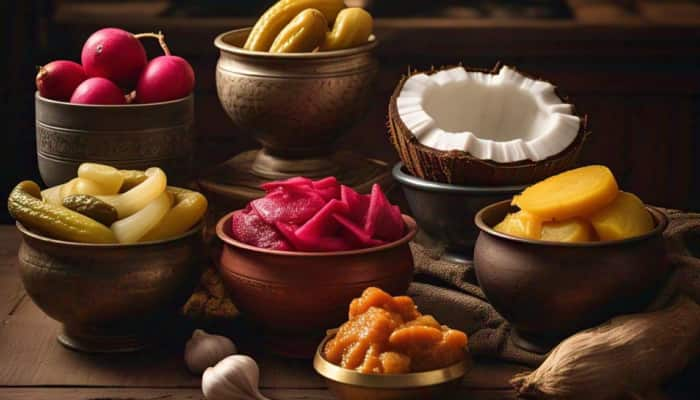Effects Of Hot Weather And Humidity On Blood Pressure And Your Heart- Expert Shares Safety Tips
Excessive temperatures and excessive humidity are both risk factors for patients with high blood pressure and heart disease. Here are tips to keep your heart healthy and blood pressure stable this season.
- Weather can play a role in triggering certain health problems
- High temperatures and high humidity can cause more blood flow to the skin
- Drinking adequate amount of water to keep your body cool and hydrated
Trending Photos
) Effects Of Hot Weather And Humidity On Blood Pressure And Your Heart- Expert Shares Safety Tips (Image source: freepik- representational purpose only)
Effects Of Hot Weather And Humidity On Blood Pressure And Your Heart- Expert Shares Safety Tips (Image source: freepik- representational purpose only) Health health: The body's efforts to dissipate heat can have an impact on blood pressure under humid conditions. High humidity and temperatures can increase the amount of blood flowing to the skin. Due to this, the heart beats more quickly and circulates twice as much blood per minute than on an average day.
Dehydration can result from a decrease in blood volume brought on by heat and perspiration, which can also lower bodily fluid levels. This could affect the body's capacity to cool down and put strain on the heart.
In conversation with Zee English, Dr. Mohit Tandon, Consultant Non Invasive Cardiologist, Fortis Escorts Hospital, Okhla –New Delhi shares how hot and humid weather affects our heart.
When we are exposed to hot weather, our body works harder to maintain a normal body temperature, this puts extra strain on our heart, lung and kidneys.
In those who are already suffering through a heart ailment it can have significant impact.
Heat, Humid and Medication
As the heart has to work harder, it can predispose individuals with heart failure or coronary artery disease to experience angina, irregular rhythm and heart failure.
A study done in Kuwait found a strong association between rising temperatures and heart related deaths with most deaths occurring in the temperature range of 35 to 43.8 degree Celsius. Such temperatures are common in Indian monsoons.
Our body sheds heat to maintain body temperature by radiation of heat and evaporation of sweat , both involve increasing blood flow to the skin, to radiate body heat and produce sweat which evaporates.
For this to occur heart works harder, and on hot and humid days your heart may circulate 2 to 4 times more blood/minute compared to a cooler day.
Also certain drugs prescribed to the heart patients may worsen the situation for example, Betablockers (prescribed to control heart rate and BP) may not allow the heart to beat faster.
Diuretics are the drugs which increase the amount of water excreted in your urine to reduce swelling of the body can predispose the individual to develop dehydration and electrolyte abnormalities.
Tips to Take Care of your Heart in Monsoon
1. Don’t go outside unless necessary in hot weather, even if necessary try to schedule your outdoor visits to avoid the hottest periods usually between 10 am to 3 pm.
2. When outside wear light colored clothing of breathable material with sweat absorbing properties like cotton.
3. Drink adequate amount of water to keep your body cool and hydrated.
4. Avoid caffeinated drinks and frequent tea as it leads to diuresis and thus loss of water
5. You can drink juicy fruits like watermelon ( tarbooj), musk melon ( kharbooj), nimbu paaani, sugarcane juice, citrus fruits.
6. Avoid exercising in hot weather, prefer early morning or late evenings when it is cooler
7. Try to keep indoor temperatures in a comfortable zone with help of air condition, coolers or fan with natural ventilation , studies suggest indoor temperatures between 25 to 30 degree Celsius as a comfortable temperature for most Indians.
8. Always check the weather advisory for conditions of heat waves, high and low temperature and the humidity levels. In a highly humid condition even lesser hot days can lead to dehydration due to increased sweating and lack of the cooling effects of evaporation.
Note: Patients with heart failure who have been advised to control their water intake should consult their doctors to know the amount of water and fluid intake permitted and any need for adjustment in their drug dosages.
9. Diabetics should consult their doctors and dieticians before trying to keep them self-hydrated by consuming frequent fruit juices or eating fruits beyond permitted range.
10. Heart patients and those with BP issues should avoid adding various additives containing salt to the juices to increase taste, as this may lead to increase in BP.
11. Do not stop or alter dosing of any drug without first consulting your doctor.
By keeping these tips in mind you can enjoy summers and remain cool.
Stay informed on all the latest news, real-time breaking news updates, and follow all the important headlines in india news and world News on Zee News.
Live Tv







)
)
)
)
)
)
)
)
)
)
